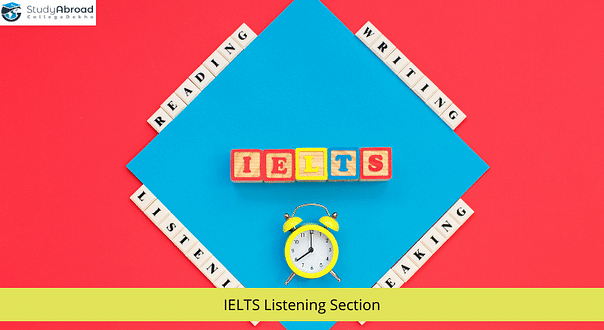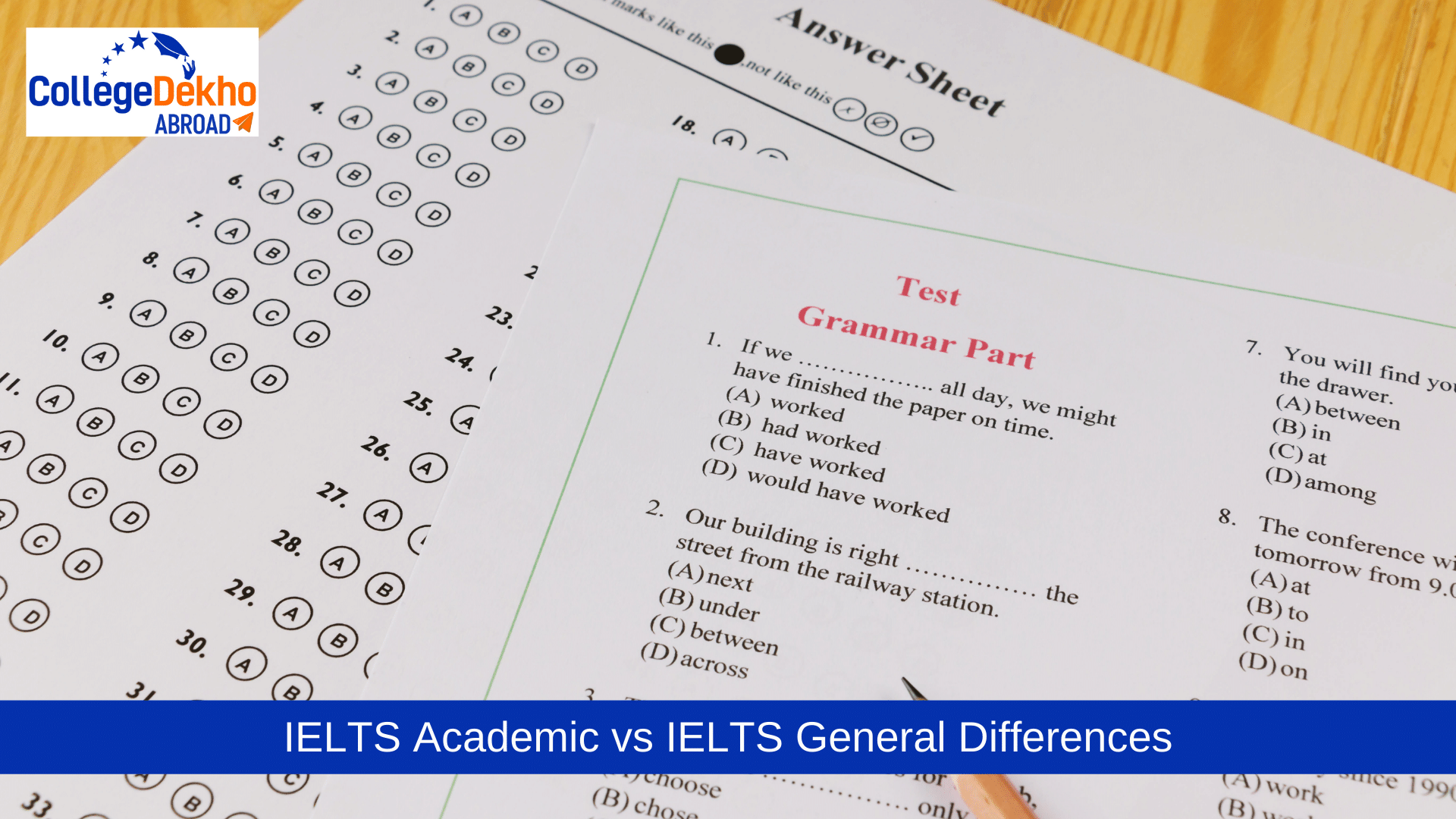IELTS Listening Section: The IELTS has four sections namely listening, writing, reading, and speaking. Listening forms a determining section as it is a passive form of communication where your receptive skill is tested by the examiners. It is an important part of the conversation because only if you listen well, you can understand and reply appropriately.
The pattern of the IELTS General Test and the IELTS Academic Tests are the same. The section basically tests how well one can retain information for a short period of time. The ability to distinguish between various sounds and accents, recognition of the vocabulary, detection of keywords are the main components of the IELTS listening test.
There are 4 recordings given to the examinees to listen after which a variety of questions are asked for them to answer within 30 minutes. Each recording contains 10 questions of 1 mark each. One has to be very sharp and alert while listening to the audio recordings and answer accordingly. Let us now look at the listening section of the IELTS in detail.
Overview of IELTS Listening Section
Let us briefly see the structure of the listening section of IELTS:
|
Parameters |
Details |
|
Number of Recordings |
4 |
|
Number of Questions |
40 |
|
Duration |
30 minutes |
|
Mark for Each Question |
1 |
|
Total Marks |
40 |
We have quality IELTS test prep programmes created based on your schedule and delivered by trained faculty from across the world.
Get Expert Guidance to Get Desired IELTS Band Score!
Objectives of the Listening Section of the IELTS
The objectives of the listening section of the IELTS are clear and distinct. They are as follows:
-
It tries to understand the ability of the examinee of understanding the main ideas conveyed in the recordings and the detailed information that it accompanies.
-
The ability to comprehend the attitudes and opinions of the speakers of the recordings.
-
The ability to understand the reason behind the utterance.
-
The potential to follow the gradual development of ideas is also checked.
Format of the IELTS Listening Section
There are four audio recordings in the IELTS Listening section which the candidate has to listen to and comprehend. The test taker then has to answer the questions that follow:
Recording 1 - It consists of a conversation between two individuals in a social context.
Recording 2 - The second recording is a monologue based on the social context of everyday life. This can be a speech on local facilities like parks, sanitation, and the hygiene of a place.
Recording 3 - The third recording is a conversation between two to four people. The context is educational or training-related. For example, a conversation between a pupil and his educator.
Recording 4 - It is a monologue mainly based on a lecture on an academic subject.
We can, therefore, see that all the four IELTS recordings alternate between a monologue and dialogue. The topics vary from social to academic to training contexts. Giving a wide variety of topics to listen broaden the examination's reach and brings the best out of you.
IELTS Listening Question Types
The IELTS question paper consists of six main types of questions:
|
Question Type |
Number of Questions |
|
Multiple Choice Questions |
Variable |
|
Matching |
Variable |
|
Labelling of Plan, Map, Diagram |
Variable |
|
Completion of Form, Note, Table, Flowchart, and Summary |
Variable |
|
Sentence Completion |
Variable |
|
Short Answer Questions |
Variable |
Multiple Choice Questions - The IELTS multiple-choice questions are provided with three choices of A, B, and C and one of them is the correct answer. The task of the candidate is to identify the correct option from the three choices. Sometimes, longer lists of possible answers are given. The candidate needs to carefully choose the correct answer. Sometimes a beginning of a sentence is given and instruction is given to choose the most appropriate ending of the sentence. The examinee must carefully understand what is expected from the answer.
Matching - A numbered list of items is given and the examinee is asked to match with the following set of options given in the answers. The set of options follow criteria of a particular kind. Here, your ear for detail is judged. They check whether you are able to process the information provided by the recordings. It also checks your potential to follow a conversation between two or more people and the ability to recognise the connections and relationships between speakers.
Labeling of Plan, Map, Diagram - Here, in this type of question, you need to label a plan, a map, or a diagram. The list of answers is given in the question paper. The focus of the task is to check your ability to understand a description or find any description relatable. The questions may include the ability to understand the spatial relationships and directions of left, right, and opposite or east, west, north, and south.
Completion of Form, Note, Table, Flow Chart, and Summary - In this section, you are required to fill up the gaps in an outlined part.
-
It may be a form to record factual information.
-
A set of notes to summarise whatever information is given using the layout to understand the relation between different items.
-
A table may be given to summarise information related to different categories.
-
A flow chart to summarise a process which has many stages with directions shown with the help of arrows.
You will have to select the words which are missing from the recordings or from the options given. This checks the normal note-taking process of the examinee.
Sentence Completion - Here, you will have to summarise from any one part of the audio recording or the full recording and answer in a word or number. The section focuses on the key points that the listeners will take note of while hearing the audio. The listener must understand the functional relationship between cause and effect.
Short Answer Questions - In short answer questions asked in the IELTS Listening, you will be required to answer in three words. The ability to fathom concrete facts such as places, prices, and times is analysed.
10 Quick IELTS Listening Section Preparation Tips
Here are some expert tips for you to excel and get a high IELTS Listening band score as per the IELTS band score chart:
-
First read all the questions carefully before listening to the audio recording. This will help you to get the correct answers quickly.
-
Read section by section and listen to the audio one at a time.
-
In the list of options where you need to select the appropriate answer, remember that the answers in the audio may not be sequentially arranged.
-
Do not write more than the specified word limit for each section.
-
Put your full attention and focus on the IELTS recording. The synonyms may also be given as questions.
-
Be careful of the pronunciation of the words or you may make common spelling mistakes in IELTS.
-
Listen attentively to the stages given in the audio recording. This will help you with the flowcharts.
-
Cross the unrelatable options while listening to the audio.
-
Be careful while marking the answers on the booklet.
-
As you need to multitask in the real examination situation, you better practice mock tests beforehand.
For more tips and explanations of the IELTS Listening section, our experts are there to help you out. They will guide you on how to score high IELTS band scores and get into top universities abroad.
Can't Decide How to Begin Your IELTS Preparation? Get Expert Guidance Today!

























